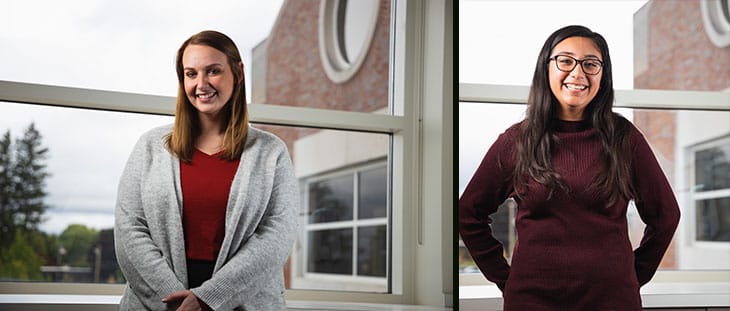
Start up
Passion. Potential. Pitches. Don't miss any of the 2025 New Venture Challenge excitement.
Tune in Friday, April 11 at 1 p.m. for great ideas and fierce competition. Then, join the judges, mentors, spectators and teams as they see who is going home with thousands of dollars in venture financing. The awards broadcast begins at 6:30 p.m. and one team will walk away as the overall best venture.
Central Michigan University’s College of Business Administration is the home of the Isabella Bank Institute for Entrepreneurship and the first Department of Entrepreneurship in the state of Michigan. We are a student-centric hub where experiential, curricular, and external entrepreneurial opportunities intersect.
Our mission is to maximize student success by fostering a campus-wide entrepreneurial mindset that promotes inter-disciplinary collaboration and the creation of new ventures.
We aim to create innovative programming, boost cross-campus and ecosystem collaboration and provide a comprehensive mentoring program.
Our institute provides extracurricular opportunities and is open to all undergraduate and graduate CMU students.
Are you interested in becoming an entrepreneur?
Every journey is unique. Explore the opportunities that interest you.
In the era of omnipresent cellphones, many teens struggle with face-to-face social skills: starting a conversation; using humor; and handling disagreements, teasing or rejection.
It's even more difficult for teens with autism, attention deficit hyperactivity disorder, depression or other social or behavioral conditions.
Central Michigan University psychology faculty and students are reaching out to help such area teens, using techniques based on the Program for the Education and Enrichment of Relational Skills, or PEERS.
Department Chair Katrina Rhymer was trained in PEERS last year and teamed up with Melissa Tuttle, director of CMU's Psychological Training and Consultation Center, to start a PEERS program in the College of Liberal Arts and Social Sciences.
But they tweaked the program to include social and behavioral disorders.
"We noticed a gap in services in Michigan for adolescents with autism spectrum disorder and a lack of group treatment for social skills," Tuttle said. "As we dug into it, we realized that our region had a need for interventions for teens with any type of limitations in their social skills development."
They are about to begin their third group session for teens and parents, each lasting about 14 weeks.
For more information or to enroll, contact Melissa Tuttle at 989-774-2386.
It starts with a phone conversation with interested parents to determine the struggles their child is having, what areas of prevention they are looking for and whether they would be a good fit for the program.
Participants are chosen based on the teens' social skills and how they would gel with the other members. Passing that, prospective students come in for an assessment of their social skills, motivation and some standardized testing.
A parent group also is formed, and the program begins.
As the teens learn to develop a particular social skill, such as initiating a socially appropriate conversation with someone, the parents learn how to help their child.
Both groups come together to discuss what they've learned, and both get homework. For example:
The next week, each shares with the group what went well and what needs work. Strategies are discussed.
Graduate and doctoral students from the clinical psychology and school psychology programs get real-world experience by helping with the initial assessment of group members, delivering instructions in group sessions and helping collect and analyze the data.
"We wanted this program to not only be an outreach to the community, but also to give our students a well-rounded education," Tuttle said.
According to two of her graduate students, that is happening.
Rachel Grinnell of Union City, Michigan, wants to be a school psychologist. This summer, she worked with an adolescent at an autism center whose program goals were to focus on social skills.
She used what she learned from the PEERS program to help the teen learn how to find friends, tell and react to jokes and share interests.
"It was full-circle for me," she said. "It all came together."
It also has helped her to be more mindful of her own interactions, such as recognizing when she is hogging a conversation and should become an active listener.
Fellow graduate student Vanessa Marquez, of Grand Rapids, Michigan, agreed.
She has learned that if she wants to get along with another person, she should find a common interest to talk about.
"I now realize just how important those smalls skills are."


Explore special opportunities to learn new skills and travel the world.

Present your venture and win BIG at the New Venture Challenge.

Boost your entrepreneurial skills through our workshops, mentor meetups and pitch competitions.

Learn about the entrepreneurship makerspace on campus in Grawn Hall.

Present a 2-minute pitch at the Make-A-Pitch Competition and you could win prizes and bragging rights!

Connect with mentors and faculty who are here to support the next generation of CMU entrepreneurs.

Are you a CMU alum looking to support CMU student entrepreneurs? Learn how you can support or donate to the Entrepreneurship Institute.